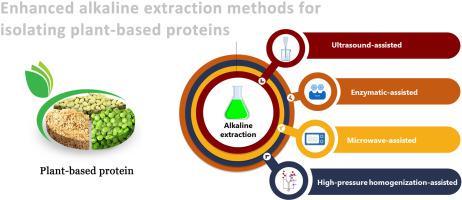Food Hydrocolloids ( IF 11.0 ) Pub Date : 2023-07-31 , DOI: 10.1016/j.foodhyd.2023.109132 Milad Hadidi , Fatemeh Aghababaei , David Julian McClements

|
The global demand for plant-based proteins is rising due to environmental, sustainability, animal welfare, and human health concerns associated with animal proteins produced by the livestock industry. The most common method for isolating proteins from plant materials is alkaline extraction, however, this method is often not efficient and may damage some proteins. Several innovative processing technologies have been explored to enhance the efficiency of protein extraction, including sonication, microwaving, enzymes, and high-pressure homogenization. These methods typically promote cell wall disruption due to the generation of intense mechanical forces or through physicochemical mechanisms, which enhances extraction. In this review, the potential utilization of enhanced alkaline extraction methods for isolating plant-based proteins and their impact on functional modification of protein alone or in combination with other innovative technologies are evaluated. The research findings clearly indicate that a combination of novel methods is more effective for the recovery and functional modification of plant proteins. The use of this cell disruption approach is more efficient for protein extraction due to its less time and energy consumption Therefore, exploring the combination of alkaline treatments with other innovative technologies could be a promising area of investigation to address the major challenges faced by the food processing industry in terms of maximizing the value of their protein resources.
中文翻译:

用于分离和修饰植物蛋白的增强碱提取技术
由于与动物蛋白相关的环境、可持续性、动物福利和人类健康问题,全球对植物蛋白的需求正在上升由畜牧业生产。从植物材料中分离蛋白质的最常见方法是碱提取,然而,这种方法通常效率不高,并且可能会损坏一些蛋白质。人们已经探索了几种创新的加工技术来提高蛋白质提取的效率,包括超声处理、微波、酶和高压均质化。这些方法通常由于产生强烈的机械力或通过物理化学机制促进细胞壁破裂,从而增强提取。在这篇综述中,评估了增强碱提取方法分离植物蛋白的潜在用途,及其对单独或与其他创新技术结合的蛋白质功能修饰的影响。研究结果清楚地表明,新方法的组合对于植物蛋白的回收和功能修饰更有效。由于时间和能源消耗较少,使用这种细胞破碎方法可以更有效地提取蛋白质。因此,探索碱处理与其他创新技术的结合可能是解决食品加工面临的主要挑战的一个有前景的研究领域行业的蛋白质资源价值最大化。































 京公网安备 11010802027423号
京公网安备 11010802027423号